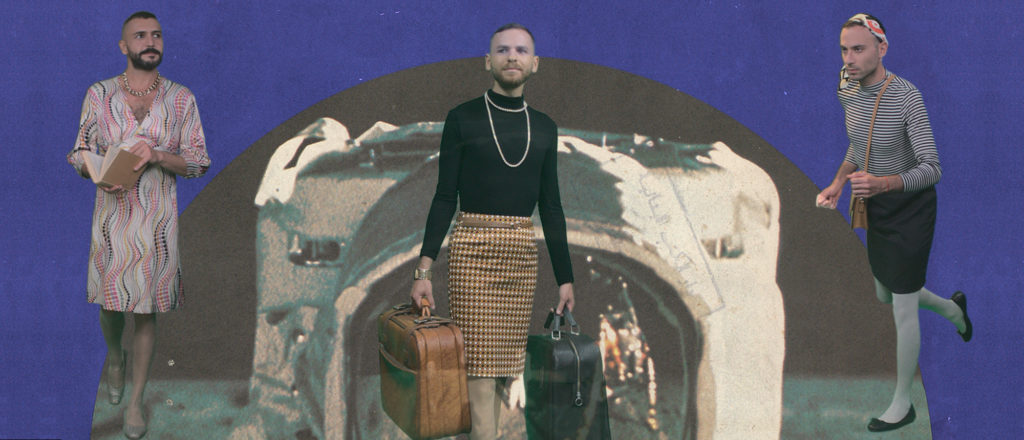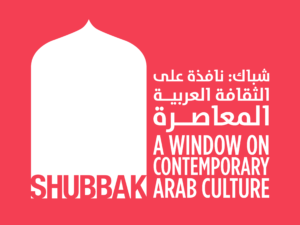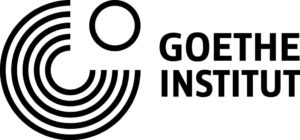
Share this:
Fehras Publishing Practices | Borrowed Faces: Future Recall
Exhibition
25/06/21—26/09/21

The Mosaic Rooms presents the first UK solo exhibition by Berlin-based art collective Fehras Publishing Practices.
Borrowed Faces: Future Recall looks at the Cold War and its effect on cultural practices in the Eastern Mediterranean and North Africa region, which generated one of the most fertile periods in the history of Arab culture and publishing. The exhibition is part of the 2021 Shubbak Festival.
Artists Sami Rustom, Omar Nicolas and Kenan Darwich have been working together as Fehras Publishing Practices since 2015. Their work playfully explores significant cultural moments in the history of Arab publishing through performance, installation and publications, skilfully blending fiction and reality.
Borrowed Faces: Future Recall unpicks the political and cultural policies of the United States and the Soviet Union during the Cold War, investigating the networks and projects funded by the rival superpowers. The exhibition has three distinct sections, presenting different strands of the artists’ current research.
One section exhibits Fehras’ photo-novel Borrowed Faces, no. 1. Through a series of photographs, the viewer is transported to Beirut in the 1960s by three women, performed by the collective. The novel follows these characters’ journeys as they interact with historical figures and institutions of the Cold War, revealing the complex tangle of power, money, creativity and friendship.
Another section presents the collective’s archives of books, magazines, letters, memoirs and photographs. The installation includes archive materials and a digital archive of Fehras’ research on publications and thinkers during the Cold War era, including from London when the city became a meeting point for Arab intellectuals.
In newly produced photographic works, the final section presents a re-imagining of the archive for the Congress for Cultural Freedom. This anti-communist cultural organisation was later discovered to have been funded by the CIA. The protagonists of Borrowed Faces reappear in this work, traveling into the future to interact with this archive. Through this and an accompanying sound piece, the artists explore the role of institutional archiving in defining knowledge hierarchies and classifying facts.
Borrowed Faces: Future Recall – exhibition press release
This exhibition was delivered in partnership with Delfina Foundation, The Mosaic Rooms and Shubbak Festival, with support from the Goethe-Institut London.
The research of Borrowed Faces was facilitated with the support from Berlin Artistic Research Grant Programme for 2020/21.
About Fehras Publishing Practices
Fehras Publishing Practices (Sami Rustom, Omar Nicolas and Kenan Darwich) is an artist collective founded in 2015 in Berlin. It researches the history and presence of publishing and its entanglement in the socio-political and cultural sphere in the Eastern Mediterranean, North Africa and the Arab diaspora. It observes publishing as a possibility for creating, and accumulating knowledge and initiate projects in different formats such as installations, films, publications, lectures and performances aiming to extend the notion of publishing.
Recent projects include Lip-Sing For Your Art!, A Bilingual Karaoke, Centre Régional d’Art Contemporain OCCITANIE / Pyrénées-Méditerranée, Sète (2020); Borrowed Faces. Issue No. 01, MMAG Foundation, Amman (2020); Borrowed Faces. Stories of Publishers during the Cold War, Neuer Berliner Kunstverein (n.b.k.), Berlin (2019); When the Library Was Stolen. On the Private Archive of Abd Al-Rahman Munif, Kampnagel, Hamburg (2018); Disappearances. Appearances. Publishing, National Museum of Contemporary Art, Athens (2018); When the Library Was Stolen, book launch and public talk, Ashkal Alwan, Beirut (2018); Soapy Post-modern Bathwater, Sharjah Biennale 13, Tamawuj, Sharjah (2017); Series of Disappearances, Villa Romana, Florence (2017); Waiting Trajectory, Haus der Kulturen der Welt, Berlin (2017).



